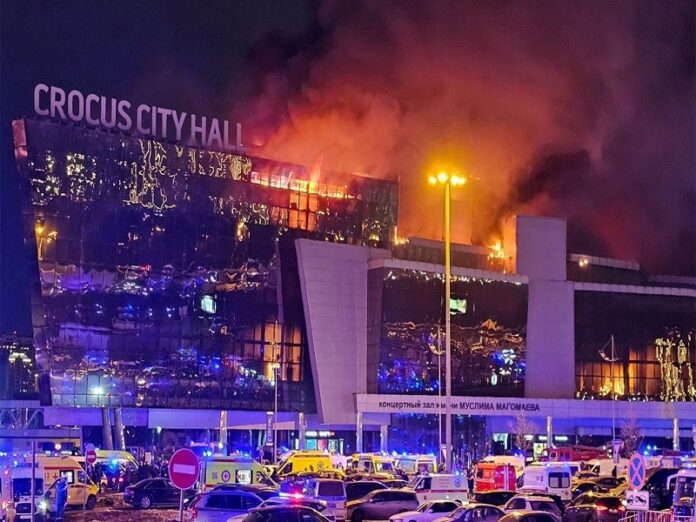India’s Economic Times reported that a key plotter of last spring’s Crocus terrorist attack, which the Russian authorities determined to have been carried out by ISIS-K in collusion with the Ukrainian military-intelligence agency GUR, might have been detained in Pakistan. According to what they learned, “Moscow had earlier approached Afghanistan to hand over the (Tajik) mastermind of Crocus terror attack but the extremist operative had allegedly slipped into Pakistan by the time Kabul could nab him.”
Publicly financed Russian media have yet to share the report at the time of this analysis’ publication nor have any Russian officials commented on the matter so its veracity remains uncertain. Nevertheless, the known involvement of ethnic Tajiks in the Crocus terrorist attack, ISIS-K’s base of operations being in Afghanistan, and the porousness of the Afghan-Pakistani border make the report believable. Terrorist-designated groups and individuals have also sought sanctuary in and operated out of Pakistan before.
This last point will be elaborated on in detail due to its importance. No evidence has emerged over the past year to suggest that Pakistan played any role in the Crocus terrorist attack, neither at the state level nor through the involvement of non-state actors operating from its soil, but it still wouldn’t be surprising if an alleged Crocus plotter fled Afghanistan for Pakistan like the Economic Times reported. That’s because the country’s ignoble reputation, which was touched upon above, attracts people of this sort.
At present, Pakistan is fighting against the “Baloch Liberation Army” and “Tehreek-i-Taliban” terrorist groups, but India has also accused it of involvement in last week’s Pahalgam terrorist attack that saw 24 tourists massacred solely on the basis of being Hindus after the culprits confirmed their faith. This contradiction of being a victim of terrorism at the same time as being accused of weaponizing it against India isn’t new and has been a staple of regional affairs since the 1990s.
To oversimplify very complex dynamics, Pakistan’s self–admitted support of the US-masterminded Afghan jihad against the USSR gave it the experience required for employing similar unconventional warfare tactics against India, but it also backfired by radicalizing large swaths of society. As radicalized Pashtuns began to wage war against the Pakistani state with the Taliban’s support, the resultant chaos created an opportunity for reviving the Baloch separatist movement, which has also resorted to terrorist tactics.
Observers also shouldn’t forget that Osama Bin Laden was killed by the US in Pakistan, where he’d been living for years in proximity to a military base, thus prompting speculation that continues to this day about how close Pakistan’s de facto military leaders were to him and other terrorists. The corruption and lawlessness that facilitate terrorism along Pakistan’s border with Afghanistan coupled with the country’s ignoble reputation that was just described could explain why that Crocus plotter allegedly fled there.
The Economic Times’ report claimed that “the Pakistani authorities may have detained him”, however, which would be to their credit if true and strengthen their ties with Russia. About that, “Russia & Pakistan Will Comprehensively Expand Cooperation In The Resource Sector” and “The PAKAFUZ Railway Through Central Eurasia Is Making Slow But Steady Progress”, which readers can learn more about from the preceding analyses. They also just held the 11th round of their counter-terrorism working group.
If Pakistan was supposedly able to swiftly detain that suspect, provided that the report is accurate, then it should be able to just as swiftly detain the Pahalgam terrorists’ Pakistani collaborators. For that to happen, India will have to share whatever information it has, which could be passed along via Russia. Indo-Pak ties have deteriorated after this terrorist attack, Pakistan just invited Russia to participate in a neutral investigation, and Russia is friendly with both so it’s sensible to have it play this role.
Moreover, from the perspective of Indian interests, it’s important for Russia to be informed of all the facts that have been established thus far for proving Pakistan’s complicity in the Pahalgam terrorist attack. Pakistani Defense Minister Khawaja Asif has gone on a media offensive in Russia by engaging with publicly financed RIA Novosti, Sputnik, and RT, but the positive effect that this might have had on reshaping perceptions of its alleged complicity could be counteracted by India’s aforesaid intelligence.
It’s for this reason that India might have already discreetly shared its findings with Russia, whether in the spirit of their strategic partnership or with the intent of Russia then passing it along to Pakistan for requesting that it detain the suspects, or it could soon be planning to do so for either reason. The same goes for the US, which recently thanked Pakistan for arresting an ISIS-K terrorist connected to August 2021’s infamous Kabul Airport terrorist attack, since American pressure on Pakistan couldn’t hurt either.
Circling back to the lede about how a key Crocus plotter might have been detained in Pakistan, its larger relevance is that it reminds readers after Pahalgam that some terrorists seek sanctuary in Pakistan, thus prompting the present analysis about why that is. As for the report itself, it’s unconfirmed but plausible, with more clarity expected soon. Independently of this, India is expected to share its findings on Pahalgam with others like Russia if it hasn’t already, which could convince them of Pakistan’s complicity.
